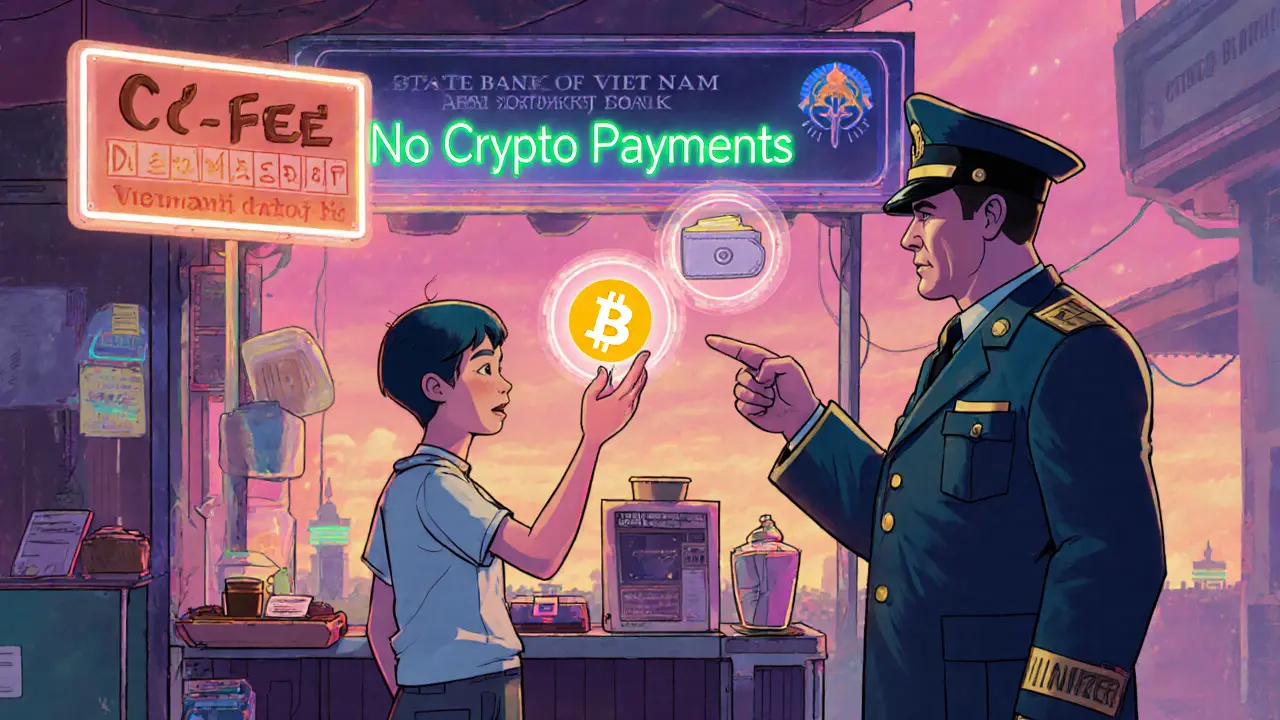Vietnam Crypto Payment Ban: 150‑200 Million VND Fines Explained
 Apr, 11 2025
Apr, 11 2025
Vietnam Crypto Payment Fine Calculator
Enter the value of any cryptocurrency transaction you might attempt to make with a Vietnamese merchant:
This transaction would incur a fixed penalty under Vietnam's crypto payment ban:
150-200 million VND
($6,500 - $8,900 USD at current exchange rates)
The State Bank of Vietnam enforces this penalty for any payment transaction using virtual currency, regardless of amount.
Ever wondered why you can hold Bitcoin in Vietnam but can’t pay for a coffee with it? The answer lies in a strict ban that carries penalties of 150‑200 million VND. This guide walks through the legal background, how the fines are applied, real‑world cases, and what the future might hold for crypto users.
What the ban actually covers
Vietnam cryptocurrency payment ban is a legal provision that makes using any virtual currency as a means of payment illegal. It does not outlaw owning or trading crypto assets; it only blocks their use for settlement of goods and services.
The rule was set by the State Bank of Vietnam (SBV) and took effect on 1 January 2018. Violation triggers administrative sanctions ranging from 150 million to 200 million VND per incident, roughly $6,500‑$8,900 USD.
The legal scaffolding
Three key decrees form the backbone:
- Decree No. 96/2014/ND-CP - defines the fine range under Clause 6, Article 27.
- Decree 101/2012/ND-CP (amended by Decree 80/2016/ND-CP) - lists lawful payment instruments and excludes crypto.
- Prime Minister Nguyen Xuan Phuc’s 2017 directive - urged the SBV to draft a clear framework.
Together, they create a narrow definition of “payment” that only covers bank‑issued tools, checks, and SBV‑approved electronic methods.
Why the SBV draws the line
SBV officials argue that crypto payments threaten monetary sovereignty, tax compliance, and anti‑money‑laundering oversight. Le Truong Tung of FTP University summed it up: accepting Bitcoin would make the economy “complex and difficult to control,” opening doors for tax evasion and illegal transfers.
In practice, the ban forces crypto activity into a gray zone: users can still hold, trade, and mine assets, but any attempt to settle a purchase with a wallet address can be prosecuted.

How the fines are enforced
Enforcement has been sporadic but visible. The SBV issued warnings in July 2017 when a university considered accepting Bitcoin for tuition; the plan was dropped after the bank’s intervention. By late 2019, the SBV reported additional penal sanctions, though exact numbers were not disclosed.
Typical enforcement steps look like this:
- Investigation - financial regulators monitor transaction patterns and merchant reports.
- Notice - the SBV sends an official warning to the offending party.
- Fine assessment - if the warning is ignored, a fine of 150‑200 million VND is levied.
- Payment - the fined entity pays the penalty to the General Department of Taxation.
Most public cases involve high‑profile merchants or educational institutions; everyday peer‑to‑peer trades tend to stay under the radar.
Comparison with neighboring countries
| Country | Payment legality | Fine range (USD) | Regulatory body |
|---|---|---|---|
| Vietnam | Prohibited | $6,500‑$8,900 | State Bank of Vietnam |
| Thailand | Allowed with license | Up to $5,000 | Bank of Thailand |
| Singapore | Allowed under Payment Services Act | Varies, usually administrative fees | Monetary Authority of Singapore |
The table shows Vietnam’s stance is the toughest in the region, focusing on punitive fines rather than licensing frameworks.
Impact on crypto adoption
Paradoxically, Vietnam ranks 8th globally in crypto adoption according to Chainalysis’ 2021 index. A World Bank 2020 survey found 43 % of adults used digital payments, indicating strong demand for alternative methods.
Because the ban only targets payment, many users keep their assets in wallets and trade on peer‑to‑peer platforms. Forums such as Bitcoin Vietnam News report ongoing informal transactions that avoid merchant involvement, thereby sidestepping the fine trigger.
However, businesses that risk the fine often choose to stay offline, limiting crypto’s integration into the mainstream economy.
Future outlook - will the ban soften?
Recent drafts hint at evolution. The 2021 Draft Decree on Virtual Assets kept the payment prohibition but classified crypto as a taxable asset. The 2022 Ministry of Finance circular on tax management suggests the government wants to capture revenue from crypto holdings.
Experts like Dr. Tran Ngoc Ca say the fine “remains technically enforceable but is increasingly hard to apply,” especially as usage grows. International pressure and the success of regulated frameworks in Thailand and Singapore could push Vietnam toward a licensing model.
For now, the safest route for Vietnamese crypto users is to keep holdings private, avoid any merchant payment, and stay alert for regulatory updates.
Practical checklist for crypto users in Vietnam
- Never use a crypto wallet to pay for goods or services.
- Keep transaction records separate from business accounts.
- If you run a merchant business, set up a compliance policy that screens for crypto payments.
- Monitor SBV announcements for any changes to fine amounts or enforcement practices.
- Consider consulting a local legal advisor if you’re unsure whether an activity violates the ban.
Key takeaways
Vietnam’s ban targets only the payment function, not ownership. Violations lead to hefty fines of 150‑200 million VND, enforced mainly against high‑visibility merchants. While the country boasts high crypto adoption, the regulatory environment remains one of the strictest in Southeast Asia. Future reforms may shift toward taxation rather than outright bans, but until then, keep crypto transactions off the checkout line.
Can I be fined for simply holding Bitcoin in Vietnam?
No. The law only penalizes the use of cryptocurrency as a payment method. Holding, trading on exchanges, or mining are not covered by the fine.
What is the exact fine amount for a crypto payment violation?
The State Bank of Vietnam sets the penalty at 150 million to 200 million VND per incident, which converts to about $6,500‑$8,900 USD at current rates.
Are there any legal ways to pay with crypto in Vietnam?
Not for direct merchant transactions. Some businesses may accept crypto indirectly-e.g., converting to VND via a licensed exchange-but the final payment must be made with a lawful instrument.
How does Vietnam’s crypto payment ban compare to Thailand’s rules?
Thailand allows crypto payments only after obtaining a specific license from the Bank of Thailand, with lower administrative fines. Vietnam’s approach is an outright ban with higher penalties.
What should a small business do to avoid the fine?
Implement a policy that screens for crypto payment requests, train staff to decline such offers, and keep documentation to prove compliance if inspected.
Susan Bari
October 24, 2025 AT 02:13Vietnam's banking elite is terrified of decentralization because it exposes how fragile their control really is.
Meanwhile, people are trading crypto on Telegram like it's 2014 and the world still makes sense.
150 million VND? That's less than a Lamborghini.
They're punishing innovation with a fine that costs less than a weekend in Bali.
And yet, Vietnam ranks 8th globally in adoption? Classic.
The people are already winning. The state just hasn't accepted it yet.
Sean Hawkins
October 24, 2025 AT 16:19By excluding crypto from the definition of legal tender under Decree 101/2012, they're not banning ownership - they're preserving the integrity of the VND as the sole unit of account.
Enforcement is targeted because systemic risk from unregulated payment rails outweighs individual liberty in this context.
Compare that to Thailand's licensing model - that's a regulatory sandbox, not a policy stance.
Vietnam's approach is conservative, but not irrational.
It's about control, not confiscation.
Marlie Ledesma
October 24, 2025 AT 20:12Like, imagine you're running a tiny pho place and someone pays you in BTC because they think it's cool - and then you get slapped with $8k.
That’s not justice, that’s a trap.
Maybe the law needs a grace period or educational warnings before fines?
People aren't trying to break the system. They just want to use tech that works.
Daisy Family
October 25, 2025 AT 00:57Also 150M VND? That's like 2000 chicken pho meals.
Who even has that kind of cash to pay a fine?
Also why is the SBV so scared? Did they lose a bet to Satoshi?
Paul Kotze
October 25, 2025 AT 15:35It shows a clear disconnect between policy and practice.
People aren't waiting for permission to innovate.
They're using P2P platforms, local exchanges, and even QR code conversions to bypass the ban.
It's not defiance - it's adaptation.
The government might be trying to protect the system, but they're fighting a tide made of smartphones and WhatsApp groups.
Jason Roland
October 26, 2025 AT 07:00People aren't using crypto because they hate the VND - they're using it because it's faster, cheaper, and works when banks don't.
And yeah, the fines are insane.
But here's the kicker: if you're rich enough to pay $8k, you're probably not the one getting caught.
The real victims are the small vendors who don't have lawyers.
Maybe the real solution isn't more fines - it's regulation that doesn't punish the wrong people.
Niki Burandt
October 26, 2025 AT 15:35Also, 43% of adults use digital payments? So they're already digital.
Why not just let crypto be the next step?
Instead, they're punishing people for using tech that's literally 15 years old.
Meanwhile, Singapore’s got a whole regulatory framework and Thailand’s licensing it.
Vietnam’s still stuck in 2017. 💀
Chris Pratt
October 26, 2025 AT 20:34People use crypto every day - just not at the register.
They'll send BTC to a friend, who converts it to VND via a local exchange, then pays the shop owner in cash.
It’s a workaround, but it works.
The government doesn't need to ban it - they just need to recognize the reality.
People aren't trying to overthrow the system.
They're just trying to pay for their bia hoi without waiting 3 days for a bank transfer.
Karen Donahue
October 27, 2025 AT 13:34They act like crypto is some dangerous new invention, when in reality, it's just money that doesn't need their permission to exist.
And yet, they're spending taxpayer money to enforce a fine that's less than the cost of a single luxury car.
It's not about financial stability - it's about ego.
The SBV wants to be the gatekeeper, but the gate is already broken.
And now they're mad because people are walking through it with their wallets full of Bitcoin.
Meanwhile, the real economy is moving on without them.
Bert Martin
October 28, 2025 AT 05:44The fines are real, but enforcement is selective.
Most cases involve big names or public institutions.
Just don't advertise that you take crypto.
Use it quietly between friends.
Keep records.
And stay informed.
Regulation will evolve - it always does.
For now, patience and discretion are your best tools.
Ray Dalton
October 28, 2025 AT 10:48Vietnam lets people mine crypto, trade it on exchanges, and hold it in wallets - but slaps a $8k fine if you use it to pay for lunch?
That's not financial policy.
That's performance art.
The SBV wants to appear tough while ignoring the fact that 80% of crypto activity already happens outside their control.
They're not protecting the system - they're just trying to save face.
Meanwhile, the next generation is learning finance through Binance and Telegram groups.
Good luck catching up.